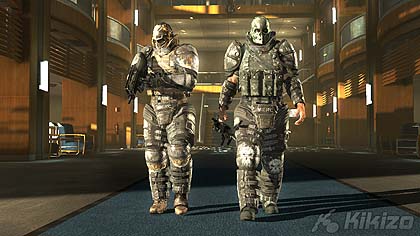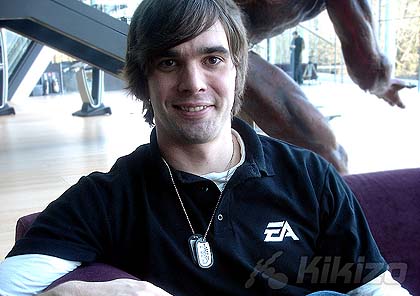Army of Two EA Interview
EA's Matt Turner tells us about getting the OK to keep the game in development, and why the team chose to focus on the present day.
Page 2
Kikizo: When you first set out with the initial brief for this game, what made you decide to set it in modern day instead of going the World War II route?
Turner: I think World War II has just been done. A lot. You know, there are a tonne of World War II games out there. It's really hard to find things with World War II that haven't done before and create a fresh feeling in that environment. So we wanted to make something that was relevant, current and also really engaging. We felt that the current day is a pretty volatile world right now. And to set out a game in that, I think it will interest people to see behaviour in that kind of environment.
Kikizo: There's tonnes you can do within the co-op play set-up here: boosting, back-to-back, and you can even emote to each other. How have you made this large range of things you can do as a team of two accessible in control terms?
Turner: It was challenging, I mean it's a fairly complex game in terms of controls. But our level designers are really talented people and were able to make the game in a way that you get introduced to it and are slowly brought forward, so that you learn these techniques as you go along. It's organic and intuitive in that respect. It makes the controls seem less complicated, because it kind of happens naturally. All those things you said - some of them like emoting are just for fun, some are functional within the game - so it's a challenge that we managed to take care of!
Kikizo: How well does singleplayer work? You've developed this Partner AI for when players want the computer to control their comrade. Can this ever be as cool as playing through with a real player?
Turner: The game, in its optimal form, is certainly when you are playing with a friend over Xbox Live - that's where it peaks. But for those who don't have access to that, the Partner AI is very good. The Partner AI team had a lot of big challenges to overcome, and they've really succeeded on all fronts. You don't have to babysit your partner, he's a self sufficient player, and he actually uses all of the tools that we provide for the player in the game by himself. Also, there's a system for controlling him that's pretty simple and intuitive, so you can manipulate the Aggro system the way you actually want to. So although it's not the optimum way of playing the game, it's actually very gratifying and fun. I mean some people even prefer it to be able to do it themselves.
Kikizo: Some people, of course, may not have a friend! Anyway, we have a story of "war, political turmoil and a conspiracy so vast it threatens the entire world". Did you have to look far past the actual world in 2008 to come up with ideas here?! I mean you guys are based in Canada not the US.
Turner: We didn't have to, but we did! Because it's a pretty fictional story. I mean, we took real-life places to propel our fictional story, but we wanted to just make a fun environment and an engaging story above all. It was tempting to dip into the real-life stuff, but we stay out of that neck of the woods, we decided to focus on making a fun game.
Kikizo: What are some of the other locations and scenes we might see in the game?
Turner: It spans over 15 years, and you start off in 1992 and you end up in the not-too-distant future in 2008 or 2009. You start off in Somalia, you go off to Afghanistan and Iraq, and then you go on to an aircraft carrier, on to China and, well I'll leave it open as it's kind of fun to kind of discover for yourself.
Kikizo: I've seen documentaries like Iraq For Sale, which heavily question this contractor-based military stuff. In Army of Two, where would you say these two guys are, on the moral spectrum?
Turner: Well, this is the thing. On the moral spectrum it's hard to balance. These guys are private contractors and they're out to make money, but they're good guys at the same time. They're not morally reprehensible. They will make the right decision when it comes down to it, whether it involves innocent people or anybody else who shouldn't be involved. So the characters themselves are quite good people, and they're fun to play with because they walk that line sometimes, you know, are they or aren't they? It's not good cop bad cop either, they're pretty much on the same page. They bicker a lot, and their personalities are very different, but with regards to the way they see the world, they're working together.







 Satoru Iwata Video Interview - the late Nintendo president spoke with Kikizo in 2004 as 'Nintendo Revolution' loomed.
Satoru Iwata Video Interview - the late Nintendo president spoke with Kikizo in 2004 as 'Nintendo Revolution' loomed. Kaz Hirai Video Interview - the first of Kikizo's interviews with the man who went on to become global head of Sony.
Kaz Hirai Video Interview - the first of Kikizo's interviews with the man who went on to become global head of Sony. Ed Fries Video Interview - one of Xbox's founders discusses an epic journey from Excel to Xbox.
Ed Fries Video Interview - one of Xbox's founders discusses an epic journey from Excel to Xbox. Yu Suzuki, the Kikizo Interview - we spend time with one of gaming's most revered creators.
Yu Suzuki, the Kikizo Interview - we spend time with one of gaming's most revered creators. Tetris - The Making of an Icon: Alexey Pajitnov and Henk Rogers reveal the fascinating story behind Tetris
Tetris - The Making of an Icon: Alexey Pajitnov and Henk Rogers reveal the fascinating story behind Tetris Rare founders, Chris and Tim Stamper - their only interview? Genuinely 'rare' sit down with founders of the legendary studio.
Rare founders, Chris and Tim Stamper - their only interview? Genuinely 'rare' sit down with founders of the legendary studio. The History of First-Person Shooters - a retrospective, from Maze War to Modern Warfare
The History of First-Person Shooters - a retrospective, from Maze War to Modern Warfare